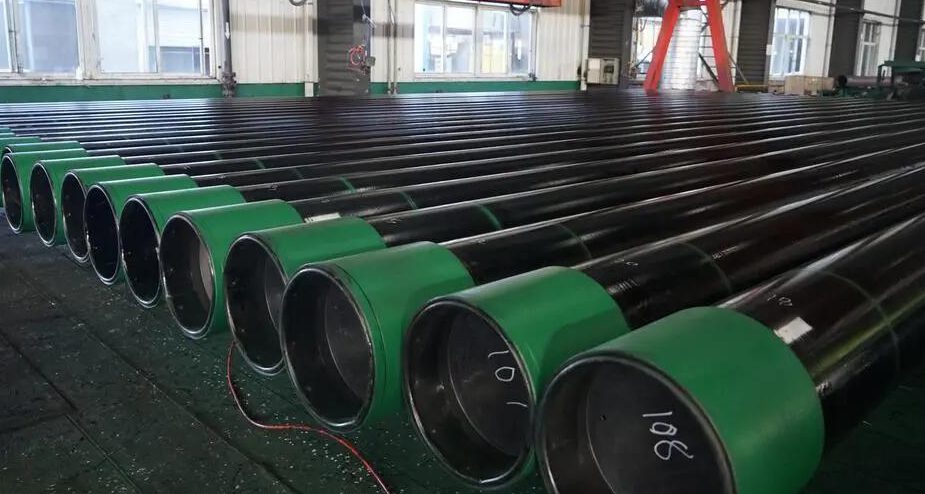
Steel Grade Classification of Oil Casing Pipe
The American Petroleum Institute API standard specifically targets oil and gas: casing pipe, tubing and line pipe standards used in industry. In the standard, the casing and tubing steel grades are divided into several grades, namely H-40, J-55, K-55, N-80, L-80, C-90, T-95, P-110, Q- 125, each level has a different heat process. In API 5CT, the raw materials were divided into four groups. The first group is H, J, K, N, the second group is C, L, T, the third group is P, and the fourth group is Q. The numbers represent the intensity level, and the codes K, N, L, C, and T represent nothing to explain. The following numbers represent the minimum yield strength of the material. The unit is KSI (thousands per square inch), H, N, K, J is the first group, the yield strength of the material is 200 MPa, L, C, T are two groups, the yield strength of the material is 100 MPa, P110 is the third group, and Q125 is the fourth group.

The API is divided into 4 groups:
The first group represents an ordinary pipe, that is, a low-strength pipe;
The second group represents a tube resistant to sulfur and corrosion;
The third and fourth groups represent high intensity levels;
J is the code name, and the API specification states that the value after the steel grade code is the minimum yield strength in units of 1000 psi (6894.7632 kPa).
For example, J-55, J is a steel grade symbol, and "55" means 55 x 1000 psi, which refers to the minimum yield strength of steel.
OCTG Casing Grade Details:
OCTG casing is manufactured in various grades, each with its own unique characteristics, in order to meet the needs of specific applications. Common grades of OCTG casing pipe include API J55, K55, L80, N80, P110 and Q125. Let’s look at these grades in more detail.
J55
API J55 casing is a general-purpose grade that is the most commonly used grade for oil and gas wells. It is known for its affordability and versatile nature. It is usually selected when cost is the main consideration. J55 casing has relatively low yield and tensile strength properties, ranging from 73,000 psi to 92,000 psi respectively. It is often used in shallow wells that require only modest pressure containment or when there is little risk of hydrogen sulfide corrosion.
K55
K55 casing is slightly stronger than J55 and is classified as a medium-strength grade. It is best suited for use in shallow wells with less stringent containment and corrosion requirements. It is also more durable and can withstand greater pressure than J55. It has an average yield strength of 82,000 psi and an average tensile strength of 110,000 psi. It is often used in onshore wells requiring medium tensile and yield strength.
N80
N80 casing is a higher grade than L80 and offers superior strength and performance in depths of up to 20,000 ft. It is most commonly used offshore and has an average yield strength of 85,000 psi and an average tensile strength of 100,000 psi. It provides superior protection against corrosion making it an ideal choice for deep, high-pressure wells.
L80
L80 casing is a higher-strength grade than J55 and K55. It combines good strength and toughness in one grade. It is particularly suited for sour service operations and is often used offshore. It has an average yield strength of 83,500 psi and an average tensile strength of 95,000 psi. It provides superior corrosion resistance, making it ideal for deeper wells with higher pressure loads.
P110
P110 casing is the highest grade of OCTG casing available. It combines exceptional strength and ductility, with an average yield strength of 105,000 psi and an average tensile strength of 125,000 psi. It is most commonly used offshore and is suitable for depths of up to 30,000 ft. It is also highly resistant to corrosion and offers superior pressure containment capabilities.
Q125
Q125 casing is a premium-grade product with exceptional strength and ductility. It is often selected for demanding applications, such as extreme depths and high pressures. It has an average yield strength of 115,000 psi and an average tensile strength of 140,000 psi. It is most commonly used in offshore wells, but can also be found in some onshore wells.
Go here to learn more about "How to Distinguish the Thread of Oil Casing Pipe?"
- 【Prev】 : Hardness Test Method for Seamless Steel Pipe
- 【Next】 : What is a Casing Pipe?


